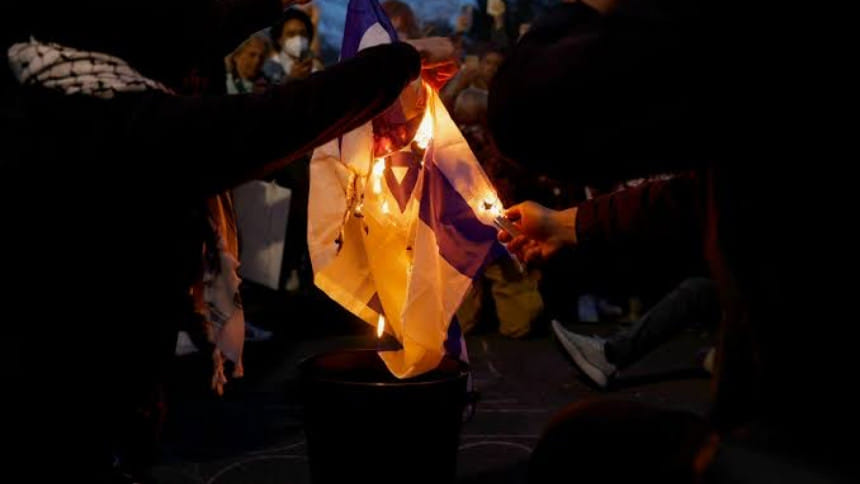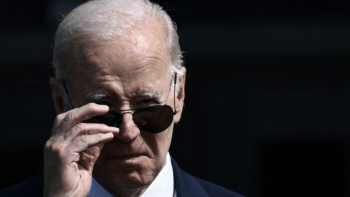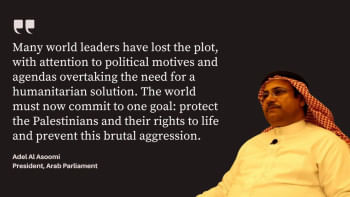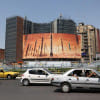A devastating act of reason

Amid widespread, near-daily protests in the US demanding a ceasefire in Israel's attacks on Palestine, an active-duty member of the US Air Force set himself on fire outside the Israeli embassy in Washington, DC on February 25, and died. The man, identifying himself as Aaron Bushnell, said, "I will no longer be complicit in genocide," in a video of the incident obtained and reviewed by CNN. His words are significant; an active-duty member in the US Air Force knows far more than an ordinary protester. Before lighting himself on fire, Bushnell said that what he was about to do was minimal compared to the suffering of Palestinians. Bushnell yelled "Free Palestine" repeatedly, till he collapsed.
The video—which he live-streamed on Twitch—and the act itself, speak volumes. Allegedly, police were in the scene from the beginning but were only able to extinguish the fire after Bushnell collapsed, as "some officers pointed guns at the protester, while others called for fire extinguishers," according to the Atlanta Community Press Collective. This particular information has not been reported by major media outlets. One cannot simply shun this self-immolation as an act of "anti-Semitism," or "terrorism," or as a personal case of "insanity." Questions need to be asked and many questions come to mind. Did this man protest to his peers and seniors in the US Air Force? Did he see things that led him to think, "I will not be complicit"? Why did he reach this level of despair in a democratic country like the US?
This is the second time that a person has set themselves on fire in front of an Israeli official building in the US. In December last year, a woman set herself on fire in front of the Israeli consulate in Atlanta, Georgia. A Palestinian flag was recovered from the scene, and the police deemed the incident as an "extreme act of political protest." Further reporting on the incident and the identity of the person was not pursued by most Western media outlets. In the aftermath, the Consul General of Israel to the Southeast US, Anat Sultan-Dadon, had stated that "it is tragic to see the hate and incitement toward Israel expressed in such a horrific way." They offered their prayers to the security officer who was injured—not to the protester—and even stated that "the sanctity of life is our highest value." The sanctity of nearly 30,000 lives brutally cut short in Gaza, however, seem to be not part of their farcical moral value.
When referring to self-immolation in other countries, particularly in non-Western countries, experts quoted in Western media reports have sympathised with it as a form of protest. For example, when a growing number of Tibetans self-immolated in China in 2012, Voice of America published an article titled "Social injustice fuels self-immolation protests." In the report, Rodger Baker of the global intelligence firm Stratfor, explained that self-immolation is "an attempt to draw attention to, in a very drastic manner, some form of political change or political injustice. So, when you see it with the Tibetans, it is about the Chinese domination of Tibet…the idea of lighting oneself on fire is beyond the level of pain that most people are willing to endure."
One must understand the history of self-immolation to gauge what the two incidents signify regarding the US' role in the genocide of Palestinians, against the interest of its own citizens.
Self-immolation is a millennia-old practice in both the West and the East, from Greco-Roman mythology to Vietnamese Buddhist monk Quaker Duc, who offered to burn himself in Saigon to protest against the persecution of Buddhists by the US-backed Catholic Diem Regime in 1963. One of the most historically significant acts of self-immolation is perhaps that of Mohamed Bouazizi—a 26-year-old street vendor in Tunisia, toiling in chronic poverty—who set himself on fire in January 2010, after ten years of harassment by police officers. With his fruits and cart confiscated, and with officials at the governing office refusing to hear his pleas, Bouazizi stood on the road and doused himself in gasoline, crying "enough." His self-immolation ignited the Arab Spring, inspiring pro-democracy movements and uprisings which saw the toppling of one Arab dictator after another.
As the self-immolation of the US airman makes news headlines, will it ignite further outrage? Will it be seen as an attempt to bring attention to the injustice being done to Palestinians? Or will it also be disregarded as an "extreme form of protest"? The way US foreign policy has unfurled in favour of Israel, we can predict some tale will be told to shut this down straight away—to ensure the questions that need to be asked are not asked. Regardless, for a US military man to light himself on fire and say what's happening to people in Gaza is much worse than what he's doing to himself must have significant motivating factors, wherein the personal is political. Preceding the US airman's self-immolation, two US officials publicly resigned over Biden's handling of the situation in Gaza, uttering similar words. Josh Paul, director in the US State Department's Bureau of Political-Military Affairs, resigned in October 2023, stating, "I fear we are making the same mistakes as we have made in the past decades, and I decline to be a part of it for longer."
Decoding the "motives" behind acts of self-immolation, Timothy Dickinson, a scholar based in Washington, DC, told The New Yorker, "Fire is the most dreaded form of all forms of death… so the sight of someone setting themselves on fire is… an assertion of intolerability." He added that "this isn't insanity, it is a terrible act of reason." Inarguably, protests with "reason" have not worked to stop the US' complicity in facilitating the genocide in Gaza. US citizens have protested against the squandering of taxpayer money to aid Israel's genocide, and there has been widespread dissent within Democrats regarding the violation of US laws which don't allow the transfer of weapons to forces engaged in human rights violations. Still, despite every logic and reasoning, and despite the fact that the International Court of Justice has ruled that Israel is committing "plausible genocide," the US vetoed a permanent ceasefire in the United Nations Security Council, for the fourth time, this week.
In 2019, Petula Dvorak, a columnist for The Washington Post, wrote, "Self-immolation near the White House or on the steps of a government building is not the final, selfish rage of someone committing a mass shooting. And it is not a lonely suicide by someone who simply wants to disappear. These acts are an unmistakable protest, the loudest, most spectacular cry that people in pain can come up with. And we owe it to them to listen." In the same vein, the two recent incidents of self-immolation in the US specifically in front of Israeli official buildings should be viewed as the ultimate protest; by those in a state of grave despair. But the first of these was largely portrayed as an act of extremism. According to the International Center on Nonviolent Conflict, "oppressive regimes are eager to portray self-immolation as an outcome of mental illness or religious extremism." How the US reacts to the Air Force member's self-immolation, chanting "Free Palestine," will reveal how much further its own democratic values have eroded in its blind support for Israel since October 7 last year.
Ramisa Rob is a journalist at The Daily Star.
We welcome your contributions and analysis of global events. To submit articles to our weekly page, Geopolitical Insights, please send an email to [email protected]
Follow The Daily Star Opinion on Facebook for the latest opinions, commentaries and analyses by experts and professionals. To contribute your article or letter to The Daily Star Opinion, see our guidelines for submission.

 For all latest news, follow The Daily Star's Google News channel.
For all latest news, follow The Daily Star's Google News channel. 










Comments